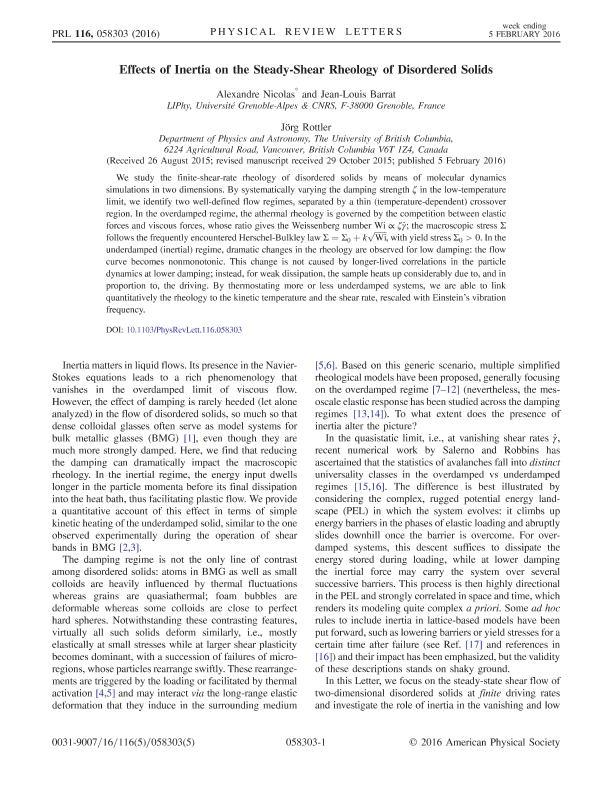Artículo
Effects of Inertia on the Steady-Shear Rheology of Disordered Solids
Fecha de publicación:
02/2016
Editorial:
American Physical Society
Revista:
Physical Review Letters
ISSN:
0031-9007
Idioma:
Inglés
Tipo de recurso:
Artículo publicado
Clasificación temática:
Resumen
We study the finite-shear-rate rheology of disordered solids by means of molecular dynamics simulations in two dimensions. By systematically varying the damping strength ζ in the low-temperature limit, we identify two well-defined flow regimes, separated by a thin (temperature-dependent) crossover region. In the overdamped regime, the athermal rheology is governed by the competition between elastic forces and viscous forces, whose ratio gives the Weissenberg number Wiζγ the macroscopic stress Σ follows the frequently encountered Herschel-Bulkley law Σ=Σ0+kWi, with yield stress Σ0>0. In the underdamped (inertial) regime, dramatic changes in the rheology are observed for low damping: the flow curve becomes nonmonotonic. This change is not caused by longer-lived correlations in the particle dynamics at lower damping; instead, for weak dissipation, the sample heats up considerably due to, and in proportion to, the driving. By thermostating more or less underdamped systems, we are able to link quantitatively the rheology to the kinetic temperature and the shear rate, rescaled with Einstein's vibration frequency.
Palabras clave:
Inertia
,
Disordered Solids
,
Temperature
Archivos asociados
Licencia
Identificadores
Colecciones
Articulos(CCT - PATAGONIA NORTE)
Articulos de CTRO.CIENTIFICO TECNOL.CONICET - PATAGONIA NORTE
Articulos de CTRO.CIENTIFICO TECNOL.CONICET - PATAGONIA NORTE
Citación
Nicolas, Alexandre; Barrat, Jean Louis; Rottler, Jörg; Effects of Inertia on the Steady-Shear Rheology of Disordered Solids; American Physical Society; Physical Review Letters; 116; 5; 2-2016; 58303-58307
Compartir
Altmétricas




